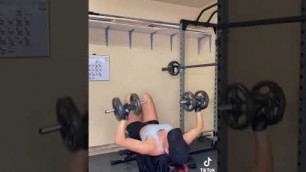

'*READ FULL ARTICLE WITH PHOTOS* https://muscularstrength.com/article/Cant-Lift-For-A-While-Learn-How-To-Keep-Your-Gains Whether it is because you are busy during the holidays, have to travel for work or maybe you have an injury I thought it would be great to talk about what you can do to minimize the damage if you can’t train for a while so you can try to maintain your gains! What Happens When You Can’t Train For A Long Period Of Time? The first thing we need to do is talk about the general timeline of what happens when you cannot exercise for a long period of time. If you stop training for a week, you are not going to lose your gains. However, you may feel SMALLER because you do not have the daily inflammation from the damage you do to your muscle tissue when training and you are also losing the “PUMP”. So you might feel like you are losing muscle, but you really are not. You are just deflating a bit. Now what happens after the first week will largely depend on how fit you are. If you are extremely fit from lifting for a number of years and have built some solid muscle, you are going to last much longer than someone who is new to lifting. There was actually a review in a Sport Science Journal saying that if you are extremely fit you will maintain your strength and mass even after one month of inactivity. But if you are a new or occasional lifter, which is someone who casually trains only a couple times a week, you will start losing muscle and strength much faster and chances are that after 3 – 4 weeks you could be back to square one. A general timeline would be something like this. Week one you will be fine, by the end of week two you may experience some muscle and strength loss and by week three you are going to be gradually losing your gains. I know this is not what you want to hear, but that is the reality my friends. But do not lose hope completely, there are some things you can do to slow down or minimize your loses! Set Your Meal Plan To A “Maintenance Level” The first thing we need to talk about is your meal plan so that you can keep feeding your muscles, but not get fat. This means we need to set your meal plan to a “maintenance level”. Think about it, if you are not lifting you are not getting the same stimulus to your muscles and you are not burning the same amount of calories and that entire surplus is going to turn to bodyfat. What I recommend to fine tune your meal plan would be to lower your carb intake. We use carbs for energy, but if we are not training then it would seem pretty simple that the answer would be to lower them. If you do not, that extra-large surplus in calories NOT burned from not training will result in you gaining fat! However, the last thing you want to do is be in a calorie deficit. That is a recipe for disaster because your body is going to catabolize your muscle tissue. So basically do not eat too much or too little, eat at a maintenance level. Now when it comes to protein, you need to make sure you are 100% eating enough protein each and every day. If you do not eat enough protein and fill your meal plan with junk food you will be on a super crash course to muscle loss. It is well known that research has found that maintaining your protein intake helps preserve your muscle tissue during a long break. So if you do not keep up with your protein, you will start to see losses in both strength and muscle mass at an accelerated rate. Train Extra Hard the Weeks Leading Up To Your Time Off A few weeks before your “time-off” you are going to want to kick things into high gear. Increase your weights, decrease your rest periods, add more sets or supersets to your workouts or even start training multiple muscles groups twice a week. Basically, look at your current workout plan and do whatever you can to make it more intense. The goal here is to cause enough damage so that during that following week when you ca not train, your body will utilize it as a “recovery week” and you will STILL be building muscle instead of starting the process of going downhill. Keep in mind that if you are going to do this you may want to make some changes to your meal plan and boost your calories to make up for the increased intensity and recovery period. *CONTINUE READING HERE* https://muscularstrength.com/article/Cant-Lift-For-A-While-Learn-How-To-Keep-Your-Gains Program Selector - Get The Right Program For You! - https://muscularstrength.com/Program-Selector ---------------------------------------- Subscribe To My Channel - https://www.youtube.com/user/ScottHermanFitness ---------------------------------------- 1 on 1 Online Coaching - http://muscularstrength.com/consultations ---------------------------------------- DOWNLOAD MY APP! – iPhone & Android! https://muscularstrength.com/phoneapp ---------------------------------------- MORE TIPS! - https://www.instagram.com/ScottHermanFitness'
Tags: Workout , exercise , bodybuilding , muscle , Weight Training (Hobby) , Physical Fitness (Industry) , Fitness (Magazine)
See also:

















comments